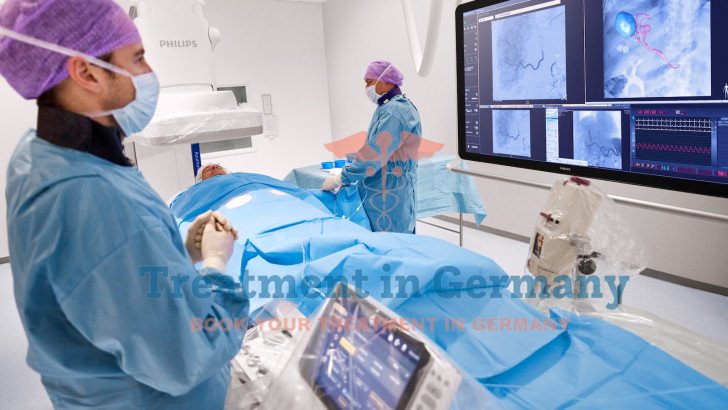
Pancreatic cancer (ICD C25) is one of the most common gastrointestinal cancers. More than 300,000 new cases are diagnosed in the world every year.
Pancreatic cancer with liver metastasis represents one of the most complex challenges in oncology, profoundly impacting pancreatic cancer patients due to its aggressive nature and advanced stage. Germany, a global leader in advanced supportive care, excels in providing holistic patient support to enhance quality of life and manage symptoms effectively. Attracting cancer patients worldwide.
Pancreatic cancer, primarily pancreatic ductal adenocarcinoma, often spreads to the liver, marking stage IV disease with a significant impact on prognosis. Risk factors include smoking, obesity, chronic pancreatitis, and genetic mutations like BRCA2. Liver metastasis exacerbates symptoms and complicates treatment, making supportive care critical to alleviate suffering and improve quality of life. German oncology centers and palliative care units lead in delivering advanced supportive care, integrating pain management, nutritional support, and emotional wellness to support pancreatic cancer patients.
Identifying symptoms of pancreatic cancer with liver metastasis is essential for tailored supportive care. Common signs include:
These symptoms can significantly impair quality of life, necessitating comprehensive diagnostic precision to guide supportive care strategies. German specialists use advanced tools to assess disease progression and tailor interventions.
Precision Diagnostic Precision for Pancreatic Cancer with Liver Metastasis
Accurate diagnostic precision is vital to inform supportive care and manage pancreatic cancer with liver metastasis. Germany’s oncology centers employ cutting-edge diagnostic tools to evaluate disease extent and patient needs:
German radiologists and oncologists deliver meticulous diagnostic precision, ensuring personalized holistic patient support for pancreatic cancer patients.
Germany’s Innovative Supportive Care Strategies for Pancreatic Cancer
Germany’s advanced supportive care framework transforms the experience of pancreatic cancer patients with liver metastasis, focusing on symptom relief, physical well-being, and emotional wellness. Oncology centers integrate multidisciplinary approaches to enhance patient well-being.
Pain Management and Symptom Relief
Effective pain management is a cornerstone of supportive care for pancreatic cancer with liver metastasis:
German palliative care specialists tailor these interventions, improving quality of life.
Nutritional Support for Physical Health
Nutritional support addresses weight loss, malabsorption, and cachexia:
German nutritionists work closely with oncologists to optimize physical health for pancreatic cancer patients.
Palliative Interventions for Symptom Control
Palliative interventions manage complications from liver metastasis:
These palliative interventions, guided by interventional radiologists, enhance patient well-being.
Emotional Wellness and Psychological Support
Emotional wellness is critical for pancreatic cancer patients facing advanced disease:
German palliative care units prioritize emotional wellness, empowering cancer patients to cope with their diagnosis.
Contributions of Clinical Trials
Germany’s leadership in clinical trials for supportive care offers access to novel supportive care strategies, often unavailable elsewhere. Trials in 2025 explore:
German oncology centers drive research, advancing holistic patient support.
Why Germany Excels in Supportive Care
Germany offers distinct advantages for pancreatic cancer patients seeking advanced supportive care:
Risk Factors and Prevention Strategies for Pancreatic Cancer
Preventing pancreatic cancer supports supportive care efforts. Key risk factors include:
German specialists recommend smoking cessation, weight management, and regular screenings (CT scans, EUS) to reduce disease risk.
Integrated Multidisciplinary Supportive Care
Germany’s multidisciplinary supportive care ensures comprehensive care for pancreatic cancer with liver metastasis:
This collaborative approach, led by German palliative care specialists and oncologists, optimizes patient well-being.
Post-Treatment Care and Sustaining Quality of Life
Following supportive care interventions, German oncology centers provide ongoing support:
Germany’s patient-centered approach ensures pancreatic cancer patients achieve sustained recovery and comfort.
Challenges and Future Directions
Supportive care for pancreatic cancer with liver metastasis faces challenges, including managing complex symptoms and patient frailty. German researchers address these through:
Future advancements, including personalized palliative interventions and digital health platforms, promise to enhance holistic patient support.
Conclusion
Germany’s advanced supportive care for pancreatic cancer with liver metastasis is transforming the experience of pancreatic cancer patients, offering hope through holistic patient support. By integrating pain management, nutritional support, palliative interventions, and emotional wellness, German oncology centers deliver compassionate, tailored care. Supported by world-class specialists and cutting-edge technology, Germany ensures exceptional quality of life and patient well-being. As a global leader in supportive care strategies, Germany provides a lifeline for cancer patients, blending scientific precision with empathetic support.
Frequently Asked Questions
What is supportive care for pancreatic cancer with liver metastasis in Germany?
It includes pain management, nutritional support, and emotional wellness, offered at German oncology centers.
What are common symptoms of pancreatic cancer with liver metastasis?
Symptoms include abdominal pain, jaundice, weight loss, and fatigue, requiring prompt diagnosis.
How is pancreatic cancer with liver metastasis diagnosed in Germany?
Through CT scans, EUS, blood tests, and biopsies at German hospitals.
Are clinical trials for supportive care available in Germany?
Yes, German oncology centers explore novel pain relief and nutritional interventions.
Is follow-up care provided after supportive care in Germany?
Yes, including imaging, rehabilitation, and emotional wellness support.
How does Germany compare to the UK/US for supportive care?
Germany excels in holistic patient support, faster access, and comprehensive care.
Can supportive care improve quality of life for pancreatic cancer patients?
Yes, supportive care strategies like pain management and nutritional support enhance quality of life.
Does Germany support international pancreatic cancer patients?
Hospitals in Germany offer language assistance, travel coordination, and emotional support.
What are the latest advancements in supportive care in Germany?
Germany pioneers AI-driven symptom monitoring, novel pain therapies, and nutritional innovations.
How does supportive care differ from active cancer treatment?
Unlike active treatment, supportive care focuses on symptom relief and quality of life, complementing chemotherapy or palliative interventions.
For more information or a free consultation, visit our contact us page.
Kindly complete the form below, and our dedicated team will reach out to you promptly. We look forward to connecting with you soon!
Trierer Straße, 56072 Koblenz, Germany

.webp)
 (1).webp)

.webp)
 (1).webp)


.webp)
 (1).webp)

.webp)
 (1).webp)
